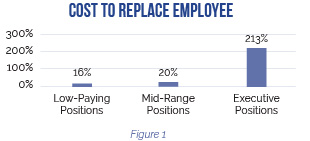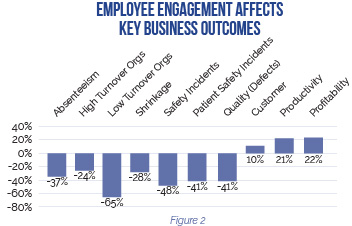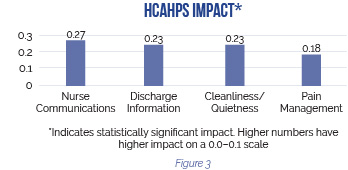To be competitive in the healthcare industry, it is no longer enough to provide the best medical equipment and facilities, or even employ the best staff. To increase patient satisfaction, experts agree that organizations must place greater emphasis on the employee experience and alignment with hospital objectives and patient outcomes.
The competition is fierce for healthcare workers as well as patients. Today, the best patient service equals strong patient loyalty. Driving patient loyalty starts with driving employee loyalty.
An effective recognition program impacts all areas of a hospital and can specifically help reduce turnover and improve the patient and employee experience, which will lead to patient loyalty and revenue growth.
Recognition Impacts Culture
A positive workplace culture (the attitudes, behaviors, and achievements of your employees) is directly impacted by your organization’s recognition strategy. Improvements in workplace culture can deliver tangible benefits that impact hospital growth, the patient experience, HCAHPS scores, engagement scores, and retention.
Implementing a strategic recognition strategy is a major part of improving workplace culture and a key driver of employee engagement. Engaged employees equate to:
- Satisfied Patients – drives hospital growth
- Innovation – maximizes the on-staff knowledge to keep your organization ahead of the competition
- Initiative – inspires employees to be proactive and helps create a responsible, autonomous workforce
- Extra Effort – drives employee satisfaction in their career and results in productivity gains
Recognition Impacts Turnover
Over $11 billion is lost every year due to turnover (Lipman3). A SHRM study indicates that it can cost 50%–60% of an employee’s salary in direct replacement costs — and this does not account for other separation costs such as disruptions to team-based work, new hires’ compensation, hiring inducements, formal training, productivity loss, etc. (David G. Allen 3-44). Gallup5 reports that more than half (51%) of the workforce is not engaged, and a higher rate of non-engaged employees means higher turnover:


Recognition Directly Impacts Employee Engagement
From the employee perspective, recognition is no longer a “nice to have”:
- 99.4% of employees expect to be recognized for good work (Nelson1)
- Only 22% in the healthcare industry feel they are recognized for such (Lowe2)
- But over 55% feel they are able to decide how to do their work and over 45% feel that they can take initiative in their jobs. Why would they take the initiative if they never get recognized for it? (Lowe2)


Recognition Impacts Patient Experience
The link between employee recognition and patient satisfaction is clear. According to Gallup Consulting, business units with highly engaged employees enjoy 21% higher profitability and hospitals with highly engaged employees score 10% higher on HCAHPS surveys:


Recognition Program Design – Best Practices
The most successful recognition programs address four key emotional needs of employees (Nohria6):
- Acquire – the drive to acquire things, experiences, status, accolades, and positions
- Bond – the desire to be connected to others through friendships, teams, and meaningful workplace interactions
- Comprehend – the desire to be challenged, learn, and demonstrate expertise and excel in the chosen fields
- Defend – a strong sense of justice and assurance that workplace practices and policies are fair
The format for employee recognition programs can include any combination of performance-based rewards, peer-to-peer recognition, referral rewards, and even rewards for innovative ideas.
Quality of the program is paramount. Many companies are still operating program formats that are out-of-date, poorly delivered or simply ineffectual.
Given today’s technologically sophisticated population and millennial employees, recognition programs need to be integrated with internal HRIS systems, operate on a consolidated and unified platform, be mobile enabled, accessible, social, and FUN.
As seen in Figure 2, recognition programs can positively impact tenure, culture, engagement, and the patient experience. All of this impacts the hospital bottom line. Improved engagement leads to a positive impact in profit by 2–85% (Towers-Watson7).
Your employees will better serve your patients and provide superior service when supported by a strategically planned and implemented recognition program. Your recognition program does not require exorbitant investment dollars and may be achievable with already allocated funds. Building a culture of recognition in your healthcare organization will lead to a more highly engaged workforce, better patient experience and higher profitability.
References
1Nelson, Bob. Post Doctoral Research. n.d.
2Lowe, Graham. “How Employee Engagement Matters for Hospital Performance.” Healthcare Quarterly 15.2 (2012): 32. Allen, David G. “Retaining Talent.” 2008. Society for Human Resource Management (SHRM). Source
3Lipman, Victor. Forbes. 14 December 2012. Source
4David G. Allen. “Retaining Talent.” 2008. Society for Human Resource Management (SHRM). Source
5Gallup Consulting. “Strengthening Care Through Engagement.” 2009. Henry Ford Connect. Source
6Nohria, Nitin. “Employee Motivation – A Powerful New Model.” Harvard Business Review – OnPoint Fall 2015: 86-93
7Watson, Towers. “Global Workforce Study.” 2012.



